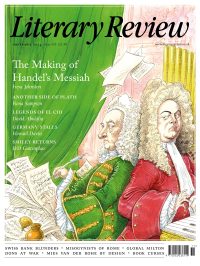Diane Purkiss
King Oliver or Citizen Cromwell?
Republic: Britain’s Revolutionary Decade, 1649–1660
By Alice Hunt
Faber & Faber 512pp £25
People who can list the wives of Henry VIII are often not aware that England was a republic for eleven years. For diehard monarchists, the period of the English Republic, ‘the Interregnum’, was a blip when everyone was waiting for the monarch to return. Not so, argues Alice Hunt in this splendidly dissident and engrossing history. And yet, ultimately, her book presents the English Republic as a series of monumental disappointments.
It doesn’t help that the English Republic means just one man to most people: Oliver Cromwell. He first comes into focus here as the butcher of Ireland. Hunt’s vivid story of how he forced horses into Drogheda through a breach in the city walls illustrates the qualities that exemplified him as a commander. It’s exactly this kind of detail that brings her characters to life. It can be difficult to understand a man who was prone to drop everything and pause while he pondered what God really wanted him to do, especially if that man was also a first-class political opportunist. As well as fierce determination, Cromwell enjoyed a share of good luck so astounding that some of his opponents decided he must have sold his soul to the Devil.
The English Republic that Hunt depicts was brutally pragmatic as well as incessantly religious. Few now remember that it was under Cromwell that Jews were readmitted to England. The Dutch rabbi Menasseh ben Israel, a brilliant Sephardic printer and tutor of Baruch Spinoza, was the man who negotiated with

Sign Up to our newsletter
Receive free articles, highlights from the archive, news, details of prizes, and much more.@Lit_Review
Follow Literary Review on Twitter
Twitter Feed
It wasn’t until 1825 that Pepys’s diary became available for the first time. How it was eventually decrypted and published is a story of subterfuge and duplicity.
Kate Loveman tells the tale.
Kate Loveman - Publishing Pepys
Kate Loveman: Publishing Pepys
literaryreview.co.uk
Arthur Christopher Benson was a pillar of the Edwardian establishment. He was supremely well connected. As his newly published diaries reveal, he was also riotously indiscreet.
Piers Brendon compares Benson’s journals to others from the 20th century.
Piers Brendon - Land of Dopes & Tories
Piers Brendon: Land of Dopes & Tories - The Benson Diaries: Selections from the Diary of Arthur Christopher Benson by Eamon Duffy & Ronald Hyam (edd)
literaryreview.co.uk
Of the siblings Gwen and Augustus John, it is Augustus who has commanded most attention from collectors and connoisseurs.
Was he really the finer artist, asks Tanya Harrod, or is it time Gwen emerged from her brother’s shadow?
Tanya Harrod - Cut from the Same Canvas
Tanya Harrod: Cut from the Same Canvas - Artists, Siblings, Visionaries: The Lives and Loves of Gwen and Augustus John by Judith Mackrell
literaryreview.co.uk